Living with and beyond cancer: The improvement story so far - NHS ...
Living with and beyond cancer: The improvement story so far - NHS ...
Living with and beyond cancer: The improvement story so far - NHS ...
Create successful ePaper yourself
Turn your PDF publications into a flip-book with our unique Google optimized e-Paper software.
10 | <strong>Living</strong> <strong>with</strong> <strong>and</strong> <strong>beyond</strong> <strong>cancer</strong>: <strong>The</strong> <strong>improvement</strong> <strong>story</strong> <strong>so</strong> <strong>far</strong><br />
Brighton <strong>and</strong> Sussex University Hospital <strong>NHS</strong> Trust<br />
Improving quality for patients <strong>with</strong> lung <strong>cancer</strong><br />
Summary<br />
A process mapping exercise highlighted<br />
areas for <strong>improvement</strong> in the care of<br />
patients <strong>with</strong> lung <strong>cancer</strong> <strong>and</strong> led to a<br />
newly designed pathway. A weekly<br />
multidisciplinary Combined Cancer<br />
Clinic (CCC) <strong>with</strong>in the Sussex Cancer<br />
Centre at BSUH has now been<br />
established where patients at any stage<br />
in their treatment pathway postdiagnosis<br />
have a holistic assessment<br />
carried out. <strong>The</strong> clinic has been<br />
designed to be more flexible to suit<br />
patients’ needs, allowing them to<br />
trigger an appointment or cancel if not<br />
required <strong>and</strong> rebook for a later date.<br />
During the consultation a Treatment<br />
Record Summary (TRS) is produced<br />
which is given to the patient either at<br />
the clinic or sent to them <strong>and</strong> their GP<br />
<strong>with</strong>in 24hrs. <strong>The</strong> patient al<strong>so</strong> has a<br />
detailed assessment <strong>and</strong> care plan<br />
(ACP) completed by the specialist<br />
nurses. All documents are given to the<br />
patient to be kept in their own patientheld<br />
record. Early feedback from both<br />
patients <strong>and</strong> staff has been very<br />
positive. Results from local <strong>and</strong> national<br />
measures are still awaited as the study<br />
period is not yet complete. Further<br />
development of the CCC will see the<br />
inclusion of a dedicated oncologist <strong>and</strong><br />
a thoracic surgeon.<br />
<strong>The</strong> problem<br />
A few issues were noted <strong>with</strong> the<br />
current lung <strong>cancer</strong> patient pathway:<br />
• Multiple clinics where patients<br />
were seen<br />
• Multiple sites where clinics were held<br />
• Suboptimal Macmillan nurse<br />
availability<br />
• Periods when care passed between<br />
different services <strong>with</strong> the risk that<br />
patients could be lost<br />
• Inadequate time <strong>with</strong> the patient for<br />
a detailed assessment of all their<br />
needs<br />
• Lack of access to other services<br />
particularly psychological support.<br />
What we did<br />
We held a process mapping exercise<br />
attended by all healthcare workers<br />
involved in the lung <strong>cancer</strong> service. A<br />
detailed map of the current service was<br />
reviewed <strong>and</strong> areas of potential risk<br />
were identified. An ideal pathway of<br />
care was designed/agreed by the MDT.<br />
As part of the <strong>improvement</strong>, a<br />
combined <strong>cancer</strong> clinic <strong>with</strong><br />
multidisciplinary input was established<br />
<strong>and</strong> held in the Sussex Cancer Centre.<br />
This clinic was designed for follow up<br />
of anyone known to have lung <strong>cancer</strong><br />
(i.e. at any point <strong>beyond</strong> the<br />
consultation where the bad news was<br />
broken). Patients could be seen by<br />
respiratory physicians, palliative<br />
medicine specialists <strong>and</strong> the Macmillan<br />
<strong>cancer</strong> nurses, <strong>with</strong> input from<br />
oncology. <strong>The</strong> duration of the<br />
appointment was extended to<br />
acknowledge the amount of additional<br />
work created by carrying out the<br />
Treatment Summary Record <strong>and</strong> ACP.<br />
<strong>The</strong>se documents were given to the<br />
patient in clinic once complete where<br />
possible <strong>and</strong> kept in a dedicated<br />
patient-held record. This enabled access<br />
by the patient/carer, GP, community<br />
services to vital information regarding<br />
ongoing treatment plans, side effects<br />
<strong>and</strong> complications, as well as signs<br />
which may need further assessment by<br />
a health professional. Patients were al<strong>so</strong><br />
given the option of cancelling/delaying<br />
their appointment if not needed, or<br />
self-triggering a consultation if<br />
required.<br />
Local measures were set to ensure that<br />
these changes were monitored both in<br />
terms of their effect on the dem<strong>and</strong> on<br />
the service <strong>and</strong> quality of care provided.<br />
An Access® based electronic database<br />
for the completion of the Treatment<br />
Record Summary <strong>and</strong> the ACP was<br />
developed as completion of paper<br />
based records during consultations<br />
proved to be very time consuming. This<br />
replaced the previous st<strong>and</strong>ard letter to<br />
the patients GP.<br />
Local measures included:<br />
• Change in distress thermometer<br />
scores (using DT) recorded at each<br />
attendance in outpatients<br />
• A local questionnaire assessing<br />
patients’ experience of the previous<br />
system of care <strong>with</strong> plans to reassess<br />
the effect of CCC on their<br />
experience<br />
• <strong>The</strong> number of lung <strong>cancer</strong> patients<br />
admitted monthly as unscheduled<br />
attendances via A&E compared <strong>with</strong><br />
the same time frame in previous<br />
years<br />
• <strong>The</strong> number of outpatient<br />
appointments triggered/cancelled<br />
<strong>and</strong> DNA<br />
• Referrals made to services outside the<br />
MDT (e.g. psychological support/<br />
dietician/physiotherapy etc).<br />
What difference has the<br />
testing work made<br />
Early indications are that the new service<br />
model is working. <strong>The</strong> ability to tailor<br />
appointments to suit the patients’ needs<br />
has been noted both by patients <strong>and</strong><br />
staff as beneficial <strong>and</strong> has led to a sense<br />
of better quality care. Overall, although<br />
the number of questionnaires given out<br />
has been a little onerous only one<br />
patient has declined to complete one.



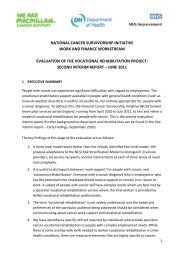
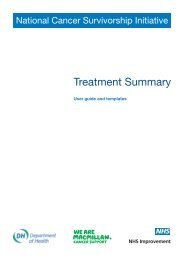
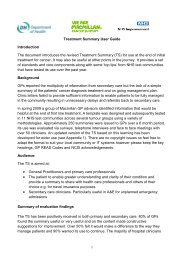
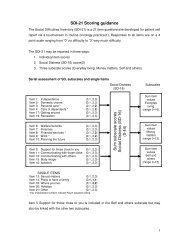
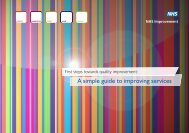
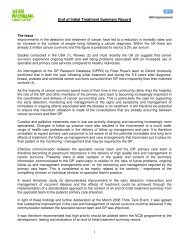
![Download the how to guide [PDF] - Macmillan Cancer Support](https://img.yumpu.com/47067428/1/184x260/download-the-how-to-guide-pdf-macmillan-cancer-support.jpg?quality=85)
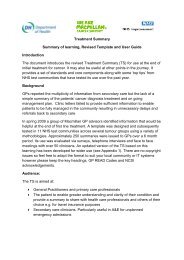

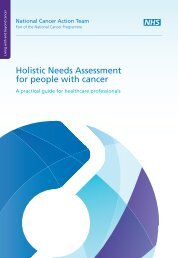
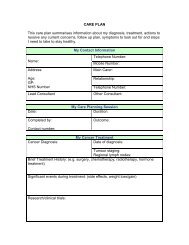

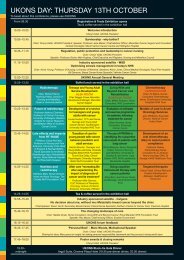
![HOPE Protocol [PDF, 420KB] - National Cancer Survivorship Initiative](https://img.yumpu.com/32566432/1/184x260/hope-protocol-pdf-420kb-national-cancer-survivorship-initiative.jpg?quality=85)